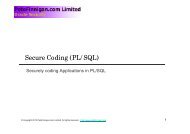Reading and Storing Data Directly From Oracle SGA ... - Pete Finnigan
Reading and Storing Data Directly From Oracle SGA ... - Pete Finnigan
Reading and Storing Data Directly From Oracle SGA ... - Pete Finnigan
You also want an ePaper? Increase the reach of your titles
YUMPU automatically turns print PDFs into web optimized ePapers that Google loves.
<strong>Reading</strong> <strong>and</strong> <strong>Storing</strong> <strong>Data</strong> <strong>Directly</strong> <strong>From</strong> <strong>Oracle</strong> <strong>SGA</strong>using Pro*C/C codeMiladin Modrakovic, May 2004rankoni@hotmail.comThere are tools on the market like Precise, Quest or even <strong>Oracle</strong> that are able to pollinformation directly from sga without impacting the <strong>Oracle</strong> kernel. This paper is anattempt to give you a general idea how such tools could be realized. This little programhas it all: it polls information straight from <strong>SGA</strong> <strong>and</strong> stores it into <strong>Oracle</strong> tables with avery high sampling frequency (easily more than hundred times per second). Gatheringdata without impacting <strong>Oracle</strong> kernel <strong>and</strong> storing inside tables is the core of expensivetools. The rest I will call it cosmetic (charts, GUI, reports etc.). This article is the sequelto the presentation called Direct <strong>Oracle</strong> <strong>SGA</strong> Memory Access written by Kyle Hailey .Heis one of the few people, if not the only one who described how to map the <strong>Oracle</strong> <strong>SGA</strong>area <strong>and</strong> published it on his website(http://oraperf.sourceforge.net/ ).What I did here is an extension to his work <strong>and</strong> an attempt to give you more lights on thistopic .The Pro*C code I wrote could be rewritten in a more efficient way (e.g. usingmultithreaded programming) but for now it serves it’s main purpose.<strong>SGA</strong> Direct Access <strong>and</strong> Pro*C• High frequency sampling rate.• Low overhead while gathering data.• Accessing <strong>SGA</strong> when querying <strong>Oracle</strong> is not possible (hangs etc…).• <strong>Storing</strong> historical data into <strong>Oracle</strong> tables for performance analysis.High Frequency SamplingThe most of the <strong>Oracle</strong> fixed views disclose aggregated information. Also <strong>Oracle</strong> kernelstatistics is not updated frequently enough. Some of the columns are updated everycouple of seconds. In order to get valuable diagnostic data you need to a query databasehundreds of times per second. The test shows that using SQL queries is very difficult tograb data more than ten times per second. Even then, you will burn CPU <strong>and</strong> encountermeasurement intrusion effect.Using <strong>SGA</strong> direct access method I was easily able to poll <strong>and</strong> store data more thanhundred times per second. The average polling rate on my testing machine was between130 <strong>and</strong> 150 times per second. Good enough.Low Overhead While Gathering <strong>Data</strong>Queering <strong>Oracle</strong> fixed views to gather system statistics imposes measurement intrusioneffect upon the <strong>Oracle</strong> kernel. The method described here samples from the <strong>Oracle</strong> <strong>SGA</strong>
<strong>and</strong> operating system memory <strong>and</strong> it does not impose any overhead on <strong>Oracle</strong> kernel.There is a low overhead on the machine itself.<strong>Storing</strong> Historical <strong>Data</strong>Because Pro*C stores data into <strong>Oracle</strong> tables it is easy to extract trend information. Alsotrend data can be plotted <strong>and</strong> forecasts can be made of future values based on thehistorical data. You can store <strong>Oracle</strong> tables inside monitoring or some other <strong>Oracle</strong>instance. In the case that monitoring instance is not accessible you will still be able topoll <strong>and</strong> store valuable collecting data.Pro*CYou need SQL to access <strong>and</strong> manipulate <strong>Oracle</strong> data. If the job requires the proceduralprocessing power of C we use embedded SQL The <strong>Oracle</strong> Pro*C precompiler enables theuser to embed SQL statements in a high-level source program.There are many different ways to compile Pro*C code. I have used one below:make -f demo_proc.mk filenameIf you receive error 'is up to date’ during compilation use option belowmake -f demo_proc.mk build EXE=sample1 OBJS=sample1.owhere demo_proc.mk is a template on which to base your makefile. It’s located in$ORACLE_HOME/precomp/demo/proc directory.Shared Memory<strong>Oracle</strong> Shared Memory is a piece of memory sharable by all processes within instance. Aprocess creates a shared memory segment using shmget(). Each process attach to a fixaddress. The original owner of a shared memory segment can assign ownership toanother user with shmctl(). It can also revoke this assignment. Other processes withproper permission can perform various control functions on the shared memory segmentusing shmctl(). Once created, a shared segment can be attached to a process address spaceusing shmat().A shared memory segment is described by a control structure with a uniqueID that points to an area of physical memory. The segment identifier is called the shmid.Accessing Shared Memory SegmentsA shared memory segment can be addressed by its key: a 32 bit integer or its sharedmemory id: an integer assigned by system.There are four primitive operations on shared memory segments:1 . int shmget (long key, int nbytes, int flags)
gets nbytes bytes of shared memory <strong>and</strong> returns a shared memory id:int shmid;shmid = shmget(key, NB, 0666 | IPC_CREAT);The flag IPC_CREAT requests the creation of the segment if it did not exist already.2 . char *shmat (int shmid, int address, int flags)attaches the shared memory segment to an address space:char *pmem;pmem = shmat(shmid, 0, 0);3. int shmdt(char *pmem)Detaches the shared memory segment before destroying it.4. int shmctl (int shmid, int cmd, int arg)To destroy a shared memory segment use:shmctl(shmid, 0, IPC_RMID);The shared memory id could be found using oradebug or sesresv utility.For detail description of oradebug utility see white paper Oradebug –Undocumented<strong>Oracle</strong> Utility located at http://www.evdbt.com/Oradebug_Modrakovic.pdfFinding shared memory id using sysresv utility:set LD_LIBRARY_PATH ( e.g. export LD_LIBRARY_PATH=$ORACLE_HOME/lib )sysresvIPC Resources for ORACLE_SID "demo9i" :Shared Memory:ID KEY30002 0x21078f90Semaphores:ID KEY583246 0x0c9c9f50<strong>Oracle</strong> Instance alive for sid "demo9i"The Session_wait.pcThe session_wait program is fully functional <strong>and</strong> for educational <strong>and</strong> testing purposesonly. This program read x$ksuse directly from the <strong>SGA</strong> <strong>and</strong> runs the equivalent toselect sid,seq#,event,p1,p2,p3,seconds_in_waitfrom v$session_waitorder by sid;
The Code headers: event.h is for translating the event# into events names.Create the file events.hsqlplus "/as sysdba" @events.sql/* events.sql */spool events.hselect 'char event[][100]={' from dual;select '"'||name||'",' from v$event_name;select ' "" };' from dual;spool off/*Find the start ADDR of KSUSECST (V$SESSION_WAIT) */select addr from x$ksusecst where rownum < 2;/* Find the Number of Records in the structure */select count(*) from x$ksusecst;/* create function to_dec */create or replace function to_dec( p_str in varchar2,p_from_base in number default 16 ) return numberisl_num number default 0;l_hex varchar2(16) default '0123456789ABCDEF';beginfor i in 1 .. length(p_str) loopl_num := l_num * p_from_base + instr(l_hex,upper(substr(p_str,i,1)))-1;end loop;return l_num;end to_dec;/* Find size in bytes of a row in KSUSECST */select ((to_dec(e.addr)-to_dec(s.addr))) row_sizefrom (select addr from x$ksusecst where rownum < 2) s,(select max(addr) addr from x$ksusecst where rownum < 3) e;/*Get offset of all fields */select c.kqfconam field_name,c.kqfcooff offset,c.kqfcosiz szfrom x$kqfco c,x$kqfta t
where t.indx = c.kqfcotab<strong>and</strong> t.kqftanam='X$KSUSECST'order byoffset;Set <strong>Oracle</strong> environment:Set ORACLE_HOME <strong>and</strong> ORACLE_SID – for monitoring database.CREATE TABLE sga$.session_wait(sid number (6),seq number (8),event varchar2 (40),p1 varchar2 (10),p2 varchar2 (10),p3 varchar2 (20),seconds_in_wait number (14))tablespace &&tablespace_name;Compile codemake -f demo_proc.mk build EXE=session_wait OBJS=session_wait.oRuntime <strong>Oracle</strong> environment:Set ORACLE_HOME <strong>and</strong> ORACLE_SID - database where sga$session_wait tableresides. Note: <strong>Data</strong> could be stored in monitoring instance itself or inside some otherinstance. If storing data in different instance than monitoring you need to createsga$.session_wait table inside that instance.Run programsession_wait sgidwhere sgid is shared memory id <strong>and</strong> could be found using oradebug or sesresv utility./*Script:session_wait.pcAuthor:Miladin ModrakovicDated: May 2004 */#include #include #include #include #include #include "events.h"#include #define ID_len 20
* <strong>SGA</strong> BASE ADDRESS */#define <strong>SGA</strong>_BASE0x80000000/* START ADDR of KSUSECST(V$SESSION_WAIT) */#define KSUSECST_ADDR 0x63D4BED7/* NUMBER of ROWS/RECORDS in KSUSECST */#define SESSIONS 218/* SIZE in BYTES of a ROW in KSUSECST */#define RECORD_SZ 2142#define KSUSSSEQ 2196 /* sequence # */#define KSUSSOPC 2198 /* event # */#define KSUSSP1R 2200 /* p1 */#define KSUSSP2R 2204 /* p2 */#define KSUSSP3R 2208 /* p3 */#define KSUSELTM 2924void *sga_attach (void *addr, int shmid){}if ( addr != 0 ) addr=(void *)shmdt(addr);addr=(void *)shmat(shmid,(void *)<strong>SGA</strong>_BASE,SHM_RDONLY);if (addr == (void *)-1) {printf("shmat: error attatching to <strong>SGA</strong>\n");exit();}return addr;EXEC SQL BEGIN DECLARE SECTION;varchar myID[ID_len], mypasswd[ID_len]; /* <strong>Data</strong>base Logon */varchar evn [10];varchar p1r [10];varchar p2r [10];varchar p3r [10];varchar name [30];int sid [4];int cpu [12];int uflg [8];int stm [8];int wtm [12];int frequency;EXEC SQL END DECLARE SECTION;/* Declare functions */void get_username();void sql_error();void clear_kb(void);/*SetUp variables */
int main(int argc, char **argv){void *addr;int shmid[100];void *sga_address;int shmaddr;void *current_addr;long p1r, p2r, p3r;unsigned int cpu,i, tim, sid, uflg, flg, evn, psqlh, sqlh, wtm, ctm, stm, ltm ;unsigned int cur_time = 0;int seq;int seqs[SESSIONS];int cmit_time=0;puts("Enter sample rate:");scanf("%d", &frequency);/* Clear stdin of any extra characters. */clear_kb();/* Register sql_error() as the error h<strong>and</strong>ler. */EXEC SQL WHENEVER SQLERROR DO sql_error("<strong>Oracle</strong> error \n");/* get values for username <strong>and</strong> password */get_username(&myID, &mypasswd);/* Connect to <strong>Oracle</strong>. */EXEC SQL CONNECT :myID IDENTIFIED BY :mypasswd;for (i=0;i cur_time ) cur_time=wtm;if ( evn != 0 ) {EXEC SQL INSERT INTO sga$.session_wait(sid, seq, event, p1, p2, p3,seconds_in_wait)VALUES(:i, :seq, :event[evn], :p1r, :p2r, :p3r, :cur_time - :wtm);
if ((cmit_time++ %100)==0) EXEC SQL COMMIT;}current_addr=(void *)((int)current_addr+RECORD_SZ);}}}void get_username(varchar *username, varchar *userpasswd){char name[ID_len];char *password;char myprompt[11]="Password: ";printf("Enter username: ");scanf("%s",&name);strcpy((char*)(username->arr), name);username->len = strlen((char*)(username->arr));password = (char*)getpass(myprompt);strcpy((char*)(userpasswd->arr), password);userpasswd->len = strlen((char*)(userpasswd->arr));}void sql_error(char *msg){char err_msg[512];int buff_len, msg_len;/* Avoid infinitely loop due to the ROLLBACK error*/EXEC SQL WHENEVER SQLERROR CONTINUE;printf("\n%s\n",msg);/* Call sqlglm() to get the complete text of the error message */buff_len = sizeof(err_msg);sqlglm(err_msg, &buff_len, &msg_len);printf("%.*s\n", msg_len, err_msg);}/* Rollback the stuff */EXEC SQL ROLLBACK RELEASE;exit(1);void clear_kb(void)/* Clears stdin of any waiting characters. */{char junk[80];gets(junk);}Viewing collected statisticsCollected information is stored into sga$.session_wait table. The actual load depends ofsampling rate, number of sessions etc .You can write your own queries to poll useful informationor use some graphical tools.The simple output look like this :
SID SEQ EVENT P1 P2 P3 SECONDS_IN_WAIT---- ---------- ------------------------------ -------------------- -------------------- ----- -----------------------------------1 5464 pmon timer 300 0 0 02 53891 rdbms ipc message 300 0 0 03 62545 rdbms ipc message 149 0 0 04 33246 rdbms ipc message 300 0 0 45 5220 smon timer 300 0 0 5365326 859 rdbms ipc message 180000 0 0 15733787 4280 SQL*Net message from client 1413697536 1 0 1712 25 SQL*Net message from client 1650815232 1 0 0ConclusionHopefully this work will inspire <strong>and</strong> shed some lights on this unknown topic.No liability for the contents of this document can be accepted. Use the concepts,examples <strong>and</strong> other content at your own risk. As this is a first version, there may be errors<strong>and</strong> inaccuracies that may of course be damaging to your system. Proceed with caution,<strong>and</strong> although this is highly unlikely, the author does not take any responsibility for that.References:Direct <strong>Oracle</strong> <strong>SGA</strong> Memory Access Kyle Hailey http://oraperf.sourceforge.net/Programming in C UNIX System Calls <strong>and</strong> Subroutines using C, IPC:Shared Memoryhttp://www.cs.cf.ac.uk/Dave/C/JEHAN-FRANÇOIS PÂRIS http://www2.cs.uh.edu/~paris/4330/shared.htm<strong>Oracle</strong> Corporation - Metal Link Note: 1083994.6 Compiling Pro*C Program






